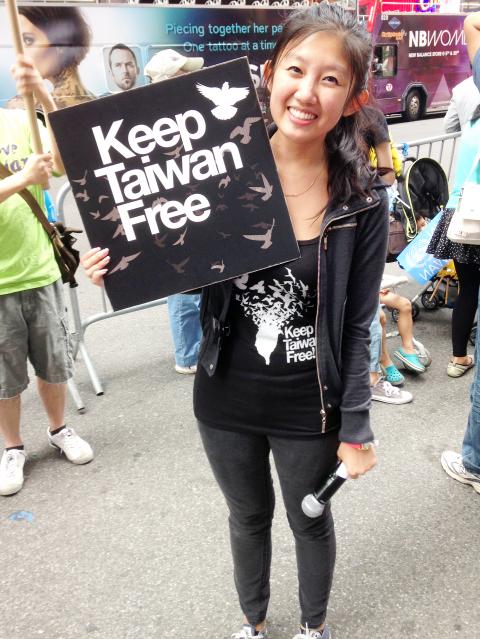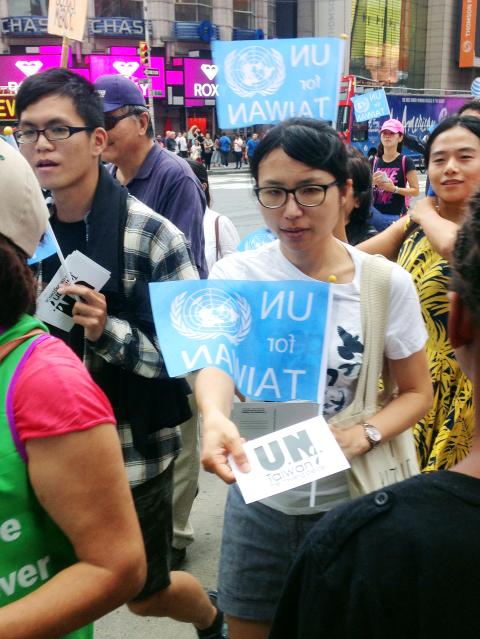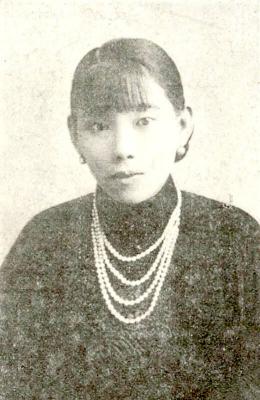Taiwanese Americans took to the streets of New York Saturday to call attention to Taiwan’s exclusion from the UN, just two weeks before Pope Francis is expected to address the 70th UN General Assembly in his first trip as pontiff to the US.
“Every year, we’re gonna shout, we’re gonna fight and we’re gonna be heard,” Outreach for Taiwan co-founder Jenny Wang (汪采羿), one of the organizers, screamed through a microphone as more than 100 people, penned in by New York Police Department metal barricades along Seventh Avenue near Times Square, waved baby-blue “UN for Taiwan” flags.
For 24 years, Taiwanese in New York have staged rallies similar to the one held on Saturday, usually timing them to the start of each new general assembly. Unlike last year’s event, this year’s included a sidewalk march from Dag Hammarskjold Plaza, a park near the UN, to Seventh Avenue between 41st and 42nd streets.

Photo: Chris Fuchs
Chanting “keep Taiwan free,” among other slogans, marchers held aloft UN for Taiwan flags as well as small green-and-white ones, featuring a green image of the nation in the center, as they threaded their way through throngs of tourists and a motley mix of cartoon characters, like Spongebob and Mickey Mouse, who posed for photos in exchange for cash with sightseers visiting Times Square.
Those attending Saturday’s rally — including more than 20 members of the Taiwan-UN Alliance (臺灣聯合國協進會), led by former Defense Minister Michael Tsai (蔡明憲) — said that Taiwan should be allowed to rejoin the UN, which gave the country’s seat to China in 1971.
“Taiwan should really strive to head in this direction,” said Hsu Chin-feng (許青風), a member of the Taiwan-UN Alliance delegation, in Mandarin. “Taiwan can’t be an international orphan.”

Photo: Chris Fuchs
One of only three countries not in the UN, Taiwan has long faced stiff opposition from China in its attempts to join the intergovernmental body. Beijing has argued that Taiwan, which it views as a breakaway province, is not a sovereign nation.
That position doesn’t sit well with Wale Adefope, a Nigerian who was visiting New York on vacation and who just happened to pass by the rally with his son Goodness. The small blue flags were what caught his eye.
“When I saw ‘United Nations for Taiwan,’ it gladdened my heart,” Adefope said, adding that Taiwan and China should both have seats in the UN.
Saturday’s march comes two weeks before the pope embarks on a six-day tour of the US, stopping in New York on Sept. 24 and 25 to say mass at Madison Square Garden and to address the UN. Some of the groups that organized Saturday’s rally were also planning to hold a sit-in at Dag Hammarskjold Plaza, near the UN, on the day the pope speaks.
Recognizing the Republic of China as the legitimate government of China, the Vatican, or Holy See, is one of only 23 nations that maintain formal diplomatic ties with Taiwan. In years past, Beijing has protested when Taiwanese presidents have attended Vatican events — such as in 2013, when President Ma Ying-jeou (馬英九) was present for Francis’ inaugural mass — where they were seated with heads of states of countries in the UN.
For Adefope, Taiwan should be able to have its own identity and be free to govern as it chooses.
“Taiwan, even back home in Africa, is well-known,” Adefope said. “And I think it would be nice if China could let go.”

Many people noticed the flood of pro-China propaganda across a number of venues in recent weeks that looks like a coordinated assault on US Taiwan policy. It does look like an effort intended to influence the US before the meeting between US President Donald Trump and Chinese dictator Xi Jinping (習近平) over the weekend. Jennifer Kavanagh’s piece in the New York Times in September appears to be the opening strike of the current campaign. She followed up last week in the Lowy Interpreter, blaming the US for causing the PRC to escalate in the Philippines and Taiwan, saying that as

This year’s Miss Universe in Thailand has been marred by ugly drama, with allegations of an insult to a beauty queen’s intellect, a walkout by pageant contestants and a tearful tantrum by the host. More than 120 women from across the world have gathered in Thailand, vying to be crowned Miss Universe in a contest considered one of the “big four” of global beauty pageants. But the runup has been dominated by the off-stage antics of the coiffed contestants and their Thai hosts, escalating into a feminist firestorm drawing the attention of Mexico’s president. On Tuesday, Mexican delegate Fatima Bosch staged a

Taiwan can often feel woefully behind on global trends, from fashion to food, and influences can sometimes feel like the last on the metaphorical bandwagon. In the West, suddenly every burger is being smashed and honey has become “hot” and we’re all drinking orange wine. But it took a good while for a smash burger in Taipei to come across my radar. For the uninitiated, a smash burger is, well, a normal burger patty but smashed flat. Originally, I didn’t understand. Surely the best part of a burger is the thick patty with all the juiciness of the beef, the

Nov. 3 to Nov. 9 In 1925, 18-year-old Huang Chin-chuan (黃金川) penned the following words: “When will the day of women’s equal rights arrive, so that my talents won’t drift away in the eastern stream?” These were the closing lines to her poem “Female Student” (女學生), which expressed her unwillingness to be confined to traditional female roles and her desire to study and explore the world. Born to a wealthy family on Nov. 5, 1907, Huang was able to study in Japan — a rare privilege for women in her time — and even made a name for herself in the